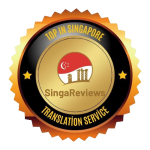
Korean to English Translation Services Malaysia: Industry Expertise for Legal, Medical, and Business Documents
In today’s connected business world, accurate translation services have become essential for companies working across borders. Malaysia’s growing trade relationship with South Korea has made professional Korean to English translation services increasingly important. With over 400 South Korean companies operating in Malaysia and bilateral trade reaching RM100.6 billion in 2024 as stated in Malaysian Investment Development Authority, the demand for specialised translation services continues to grow.
This article explores how professional Korean translation services in Malaysia support businesses across legal, medical, and technical sectors, ensuring accurate communication whilst meeting industry-specific requirements.
Why Professional Korean Translation Matters in Malaysia
The partnership between Malaysia and South Korea has strengthened significantly in recent years. Based on the Free Malaysia Today (FMT) platform, Malaysia secured RM32.8 billion in potential investments from South Korea during Prime Minister Anwar Ibrahim’s official visit in late 2024. Major Korean companies such as Samsung, Hyundai, POSCO, and Lotte Corporation have established operations in Malaysia, creating substantial demand for reliable translation services across multiple industries.
Professional Korean translation services Malaysia provide more than simple word-for-word conversion. They ensure cultural accuracy, technical precision, and compliance with local regulations. The Korean language presents unique challenges that require specialised expertise, including complex honorifics systems, context-dependent meanings, and significant grammatical differences from English.
Businesses that invest in professional Korean translators Malaysia benefit from improved communication, reduced legal risks, and stronger relationships with Korean partners and clients. The translation services market in Malaysia is projected to reach approximately USD 68.31 million by 2025, with an anticipated annual growth rate of about 25.79% until 2030 according to Statista.
With increasing collaboration between British and Korean companies, accurate language interpretation has become essential for maintaining clear communication. To explore how professional Korean translation and interpreting services can support business, academic, and legal exchanges, see this article on Korean translation and interpretation services, which highlights Elite Asia’s expertise in delivering culturally precise and confidential solutions.
Legal Korean Translation Malaysia: Ensuring Compliance and Accuracy
Legal translation represents one of the most demanding areas of Korean to English translation services Malaysia. Legal documents require absolute precision, as even minor errors can lead to serious consequences, including contract disputes, regulatory violations, or compromised legal proceedings.
Accurate legal translations are vital to ensure compliance, prevent misunderstanding, and protect your rights in international dealings. For practical insight into why professional translation matters for both individuals and businesses, read this article on translating supporting legal documents professionally, which explains the risks of self‑translation and the benefits of using certified experts.
1. Types of Legal Documents Requiring Korean Translation
Professional Korean translators specialising in legal work handle various document types, including contracts and agreements, court documents and judgements, patent applications and intellectual property filings, merger and acquisition documentation, immigration papers and visa applications, affidavits and powers of attorney, and employment contracts.
The legal translation process demands translators who understand both Korean and Malaysian legal systems. Certified translation services Malaysia must adhere to strict standards set by recognised institutions such as Institut Terjemahan & Buku Malaysia (ITBM), Dewan Bahasa dan Pustaka (DBP), and the Malaysian Translators Association (MTA).
When companies operate internationally, ensuring legal documents meet language and jurisdictional requirements is crucial to avoid disputes and compliance issues. To learn more about which business documents require translation and how language precision affects legal validity, read this guide on common types of business legal translations and their language requirements, which explores best practices for accurate, industry‑specific translation.
2. Challenges in Legal Korean Translation
Korean legal terminology often lacks direct English equivalents, requiring translators to carefully interpret legal concepts whilst maintaining the original intent. The Korean language’s use of honorifics and formal language structures adds complexity to legal documents, where tone and respect levels can affect contractual relationships.
Certified translation services Malaysia for legal documents must include a translator’s declaration of accuracy, official stamps and seals, and identification details. For international use, additional notarisation or Ministry of Foreign Affairs attestation may be required.
As Malaysia continues to expand its global partnerships, the role of precise and legally compliant translation grows increasingly important. To explore how technological innovation and expert human insight are shaping this field, see this article on legal translation services in Malaysia, which discusses the balance between AI tools and professional translators in ensuring accuracy and authenticity.
Medical Document Translation Malaysia: Protecting Patient Safety
Medical translation demands exceptionally high standards of accuracy. In healthcare settings, translation errors can lead to misdiagnosis, incorrect treatments, or life-threatening situations. Professional Korean translators Malaysia specialising in medical fields possess both linguistic expertise and comprehensive knowledge of medical terminology.
1. Critical Medical Documents Requiring Translation
Healthcare institutions and pharmaceutical companies rely on medical document translation Malaysia for clinical trial protocols and reports, patient medical records and histories, pharmaceutical product information and drug labels, medical device manuals and specifications, informed consent forms, diagnostic reports and test results, and research papers and medical studies.
Accurate translation is critical in the pharmaceutical sector, where even minor errors can lead to regulatory setbacks or patient safety issues. To better understand how expert linguists ensure precision, cultural sensitivity, and compliance in this highly specialised field, see this article on navigating the complexities of medical translation in the pharmaceutical industry, which explores the balance between scientific accuracy and cross‑cultural communication.
The medical field uses highly specialised vocabulary that changes rapidly with new discoveries and treatments. A single mistranslated term in medication dosage or administration instructions could endanger patient lives. Professional medical translators undergo continuous training to stay current with evolving medical terminology.
In the global pharmaceutical sector, accurate language translation is vital for compliance, patient safety, and international market expansion. To explore how expert linguistic services help pharmaceutical companies communicate effectively and meet global standards, read this article on why medical translation is essential for pharmaceutical companies, which explains its regulatory importance and impact on healthcare outcomes.
2. Quality Standards in Medical Translation
Medical translation requires strict quality assurance processes. Professional translation services follow the TEP (Translation, Editing, Proofreading) process, ensuring multiple review stages before final delivery. Translators working on medical documents typically hold qualifications in medical sciences or have extensive experience in healthcare settings.
Medical translation is one of the most demanding fields in the language industry, as even minor inaccuracies can lead to serious consequences in healthcare and research. To explore the complexities professionals face, from handling technical terminology to managing cultural nuances, see this article on the top challenges faced when translating medical documents, which examines how expert translators ensure precision and patient safety.
For clinical trials and pharmaceutical documentation, translations must comply with international standards and regulatory requirements. Back-translation verification, where content is translated back to the source language, often serves as an additional quality check, particularly for ethics committees and regulatory authorities.
When conducting international clinical trials, maintaining translation accuracy and regulatory compliance is vital to ensuring credible results across multiple languages and jurisdictions. To learn how to streamline multilingual documentation while upholding these standards, see this guide on best practices for managing global clinical trial documents, which outlines effective strategies for translation, confidentiality, and cross‑cultural communication.
Business Translation Services Malaysia: Facilitating International Commerce
Korean business translation services support companies in various commercial activities, from marketing campaigns to financial reporting. As Malaysia positions itself as a strategic hub for South Korean investment, accurate business translation services Malaysia have become essential for successful market entry and operations.
1. Business Documents Requiring Korean Translation
Companies engaged in Malaysia-Korea trade require translation for annual reports and financial statements, marketing materials and advertising content, business proposals and tender documents, corporate communications and press releases, website content and e-commerce platforms, technical specifications and product catalogues, and training materials and employee handbooks.
Financial translation demands particular attention to numerical accuracy and industry-specific terminology. Banking documents, audit reports, investment prospectuses, and balance sheets must be translated with absolute precision to prevent costly errors.
Expanding a business internationally requires meticulous attention to documentation accuracy and compliance. To understand how certified translations support overseas registration, legal submissions, and investor confidence, read this article on the benefits of obtaining certified translations for business documents, which explains how professional certification ensures reliability and credibility across global markets.
2. Localisation Beyond Translation
Effective business translation extends beyond literal conversion. Professional translation company Malaysia services include localisation, adapting content to resonate with the target market’s cultural context and preferences. This approach ensures marketing messages connect authentically with Korean or Malaysian audiences.
Website localisation requires translating not just text but also adapting design elements, payment methods, and user experience to match local expectations. Korean language experts Malaysia understand these cultural nuances, helping businesses avoid potentially embarrassing misunderstandings or offensive content.
For companies operating across borders, legal language precision is essential to avoid compliance issues and contractual misunderstandings. To gain insight into the most common document types that require expert legal translation and how language standards vary internationally, see this guide on common types of business legal translations and their language requirements, which outlines key practices for maintaining clarity and accuracy across jurisdictions.
Technical Korean Translation Malaysia: Precision in Specialised Fields
Technical translation covers diverse industries, including engineering, information technology, manufacturing, automotive, and construction. These sectors require translators with subject-matter expertise who understand complex technical concepts and specialised terminology.
1. Industries Requiring Technical Korean Translation
South Korea’s technological advancement has created demand for technical Korean translation of Malaysia across semiconductor manufacturing, automotive engineering, telecommunications, renewable energy, consumer electronics, and industrial machinery. Malaysia’s growing role in these sectors, particularly following major investments from companies like Samsung and Hyundai, has increased the need for accurate technical documentation.
Technical manuals, engineering specifications, safety documentation, and software interfaces must be translated with absolute accuracy. Errors in technical translation can lead to equipment malfunctions, safety hazards, or operational failures.
2. Quality Assurance in Technical Translation
Professional Korean language experts Malaysia use computer-assisted translation (CAT) tools to maintain consistency across large technical projects. These tools utilise translation memories and terminology databases, ensuring technical terms are consistently translated throughout documentation.
Technical translators typically hold degrees or extensive experience in relevant engineering or technical fields. This background knowledge allows them to accurately interpret complex concepts and select appropriate technical terminology in the target language.
Notarised Translation Malaysia: Meeting Official Requirements
Official document translation Malaysia often requires notarisation for legal validity. Notarised translation Malaysia involves having documents certified by authorised translators and, when necessary, further authenticated by notary publics and government authorities.
1. Documents Requiring Notarisation
Birth, marriage, and death certificates, educational diplomas and transcripts, company registration documents, powers of attorney and affidavits, and identity documents and passports frequently require notarised translations for official use.
In Malaysia, certified translations must come from translators registered with ITBM, DBP, MTA, or appointed by the High Court. For international use, additional attestation from Malaysia’s Ministry of Foreign Affairs (Wisma Putra) may be necessary.
Clear and accurate records are essential in the legal field, where every word can influence a case’s direction. To understand why transcribing legal proceedings into written form improves accuracy, efficiency, and accessibility, read this article on the benefits of using legal transcription, which explains how professional transcription services support law firms and legal professionals.
2. The Notarisation Process
The certification process involves translation by qualified professionals, review and quality checking, certification with official stamps and seals, notarisation by licensed notary public (if required), and Ministry of Foreign Affairs attestation for international use.
Professional translation company Malaysia services handle these complex administrative requirements, ensuring documents meet all legal standards for submission to government agencies, educational institutions, or foreign embassies.
The Elite Asia Advantage: Industry-Leading Korean Translation Services
Professional Korean translation requires a combination of linguistic expertise, industry knowledge, and rigorous quality standards. Translation services should employ native speakers with specialised qualifications, implement comprehensive quality assurance processes, maintain strict confidentiality and data security, and deliver projects within agreed timeframes.
1. Selecting the Right Translation Provider
When choosing Korean to English translation services in Malaysia, businesses should consider translator qualifications and industry specialisation, certification and accreditation status, quality assurance processes and review procedures, confidentiality agreements and data protection measures, turnaround times and project management capabilities, and client testimonials and track record.
Professional translation services utilise advanced technology, including cloud-based project management systems, real-time collaboration tools, translation memory and terminology databases, and secure data encryption and backup systems. These technologies enhance efficiency whilst maintaining the human expertise essential for accurate, culturally appropriate translations.
2. Quality Standards and Certifications
Leading translation services maintain ISO 9001:2015 Quality Management certification, ensuring consistent service delivery. The ISO 9001:2015 standard specifically addresses translation service requirements, covering translator qualifications, project management processes, and quality assurance procedures.
These certifications demonstrate a translation provider’s commitment to professional excellence and systematic quality control throughout the translation workflow.
Overcoming Common Korean Translation Challenges
Korean to English translation presents unique linguistic challenges that require specialised expertise to overcome effectively.
1. Grammatical Structure Differences
Korean follows a Subject-Object-Verb sentence structure, contrasting with English’s Subject-Verb-Object pattern. This fundamental difference requires translators to restructure sentences entirely rather than simply substituting words.
Context-dependent meanings in Korean add another layer of complexity. The language frequently omits subjects when context makes them clear, whilst English typically requires explicit subjects. Professional translators must interpret implied meanings and add necessary clarification for English readers.
2. Honorifics and Formality Levels
The Korean language incorporates complex honorific systems that indicate relationships between speakers. Different verb endings and vocabulary express varying levels of respect and formality. Translating these nuances appropriately requires deep cultural understanding beyond linguistic knowledge alone.
In business and legal contexts, maintaining appropriate formality levels is crucial for preserving professional relationships and contractual respect. Expert translators understand how to convey these social dynamics in English translations.
3. Cultural References and Idioms
Korean idioms and cultural references often lack direct English equivalents. Professional Korean language experts Malaysia adapt these expressions to convey equivalent meanings that resonate with English-speaking audiences whilst preserving the original intent.
Marketing and advertising translations particularly benefit from this cultural adaptation, ensuring messages connect authentically with target audiences rather than confusing or alienating them.
The Future of Korean Translation Services in Malaysia
The translation services industry continues evolving with technological advancements and increasing globalisation. Several trends are shaping the future of Korean to English translation services Malaysia.
1. Artificial Intelligence and Human Expertise
Whilst AI-powered translation tools have improved significantly, professional translation services recognise that human expertise remains essential for accuracy, cultural appropriateness, and contextual understanding. The most effective approach combines AI efficiency with human review and cultural adaptation.
Machine translation may provide rough drafts for simple content, but business, legal, and medical documents require professional Korean translators Malaysia to ensure precision and cultural relevance.
2. Growing Demand Across Industries
As Malaysia-Korea economic ties strengthen, demand for specialised translation services will continue growing. The anticipated Malaysia-Korea Free Trade Agreement will further increase the need for professional translation services across trade, investment, and regulatory compliance.
Industries such as semiconductor manufacturing, electric vehicles, green technology, and renewable energy represent key growth areas requiring extensive technical translation support.
3. Specialisation and Industry Expertise
Translation professionals increasingly specialise in specific industries, recognising that broad subject-matter knowledge is essential for accurate translation. This specialisation trend benefits clients through improved accuracy, appropriate terminology usage, and deeper understanding of industry context and requirements.
Ensuring Translation Quality: Best Practices
Businesses working with Korean translation services should implement best practices to ensure optimal results.
1. Provide Context and Reference Materials
Supplying translators with background information, glossaries, style guides, and reference documents improves translation accuracy and consistency. Context helps translators understand intended meanings and select appropriate terminology.
2. Allow Adequate Turnaround Time
Whilst urgent translations are sometimes necessary, allowing reasonable timeframes enables thorough translation, editing, and quality review processes. Rushed translations increase error risks, particularly for complex technical, legal, or medical content.
3. Establish Clear Communication
Maintaining open communication with translation providers helps address questions, clarify ambiguities, and ensure deliverables meet expectations. Professional translation companies assign dedicated project managers to facilitate smooth coordination.
4. Implement Review Processes
For critical documents, consider implementing back-translation verification or having subject-matter experts review translated content. These additional quality checks provide extra assurance for high-stakes translations.
Effective communication lies at the heart of successful international business operations. To discover how professional translation can enhance brand credibility and support global growth, see this article on content and document translation services, which explains how expert translators ensure accuracy, confidentiality, and consistency across multilingual materials.
Partner with Professional Korean Translation Experts
Successful international business operations depend on accurate, culturally appropriate communication. Professional Korean to English translation services Malaysia provide the expertise necessary to navigate linguistic and cultural complexities across legal, medical, and business sectors.
By partnering with experienced translation providers who employ qualified native speakers, maintain rigorous quality standards, and understand industry-specific requirements, businesses can communicate effectively with Korean partners, comply with regulatory requirements, and build strong international relationships.
Elite Asia offers comprehensive Korean translation and interpretation services backed by industry expertise, advanced technology, and a proven track record across diverse sectors. Whether you require certified legal translations, precise medical documentation, or culturally adapted business content, professional Korean language experts ensure your message is accurately conveyed whilst meeting the highest quality standards.
Ready to bridge language barriers and expand your business opportunities? Visit Elite Asia’s Korean Translation Services to discover how professional translation expertise can support your international success.










